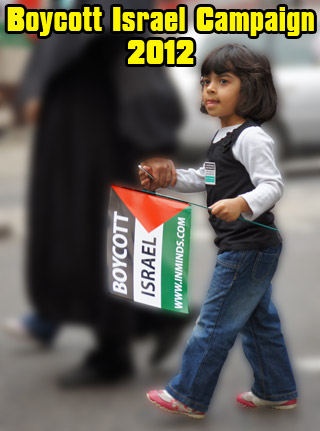
 Innovative Minds © 2014. All Rights Reserved. www.inminds.co.uk | ||||
|
Comment: Remember Jim Allen's play "Perdition" which exposed the collaboration of the Zionist leaders of Hungary's Jewish community in the Nazi extermination programme? Remember how the zionist lobby effectively had it banned (1987) - well here we go again, this time with the play "My Name Is Rachel Corrie".. 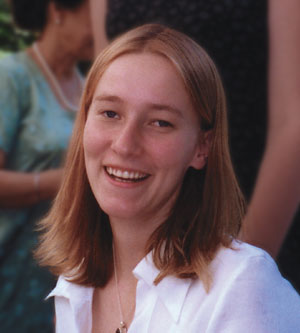 Rachel Corrie was a 23 year old college student and human rights activist from Olympia, Washington. On March 16, 2003, she was run over and killed by an Israeli military bulldozer in Rafah, Gaza, while defending a Palestinian home from demolition. A gifted writer, Rachel left behind a series of diaries and emails from an early age which were crafted into a play by Alan Rickman and Katharine Viner. For more information please visit http://www.rachelswords.org Theater won't stage controversial dramaChristine Dolen, The Miami Herald A South Florida theater dropped a controversial play about an American activist killed in the Gaza Strip. My Name Is Rachel Corrie, the controversial play about a young American activist who died after she was run over by an Israeli-operated bulldozer in the Gaza Strip, has been pulled from the lineup at Plantation's Mosaic Theatre after protests from some of the theater's subscribers and outside individuals. Mosaic, a professional company that presents its shows in a black-box theater space at the private American Heritage School, had planned to offer the one-woman Rachel Corrie in repertory with Heather Raffo's 9 Parts of Desire, a solo show about Iraqi women. But Mosaic's board of directors agreed to drop the play after phone calls, e-mails and comments on a special Rachel Corrie blog -- which has now been removed from the company's website -- made it clear that an impassioned, vocal minority strongly objected to the play. There have been no such complaints about Raffo's play, which actress Pilar Uribe will perform April 18 through May 13. Artistic director Richard Jay Simon, who declined a request for comment, wrote in a release Monday announcing the cancellation, ``Exploring critical issues to inspire healthy dialogue is and always will continue to be our mission at Mosaic Theatre. I believe strongly in the piece and, while I respect the board's decision, I am obviously disappointed.'' A more telling sentence in the release notes that ``numerous conflicts have arisen, and the associated risks appear too great for our community and our angel sponsor, American Heritage School.'' Efforts Monday to contact theater board members were unsuccessful. Except for its 2005 premiere production at London's Royal Court Theatre, My Name Is Rachel Corrie has stirred such conflict wherever it has been produced -- or, in several cases, not produced. Both the New York Theatre Workshop and a Toronto theater company dropped it altogether. Other producers finally brought it to Off-Broadway's Minetta Lane Theater last October, where it got mixed reviews. A current, glowingly reviewed production at the Seattle Repertory Theatre is so successful that its run has already been extended; however, three Jewish groups took out ads in the play's program denouncing the play, and protesters have been handing anti-Rachel Corrie leaflets to arriving theatergoers at each performance. ''We weren't inclined to censor the ads. We thought carefully and came to the conclusion that it was best to allow expression of their points of view,'' said Benjamin Moore, Seattle Rep's managing director. ``I think it's thrilling for there to be this conversation about something people don't feel comfortable talking about. So far, it's a civic discourse vs. a shouting match.'' The script, shaped by actor Alan Rickman and journalist Katharine Viner from Corrie's letters, e-mails and journals, offers a 90-minute glimpse into the life, dreams and premature death of the 23-year-old activist from Olympia, Wash. When she died March 16, 2003, Corrie was in Gaza working with the International Solidarity Movement to protest the Israeli razing of Palestinian homes; Israel, however, said it was destroying tunnels used to smuggle weapons. Standing in front of a bulldozer headed toward a house, Corrie fell and was crushed. An Israeli investigation determined her death was accidental. Her fellow activists maintained the bulldozer's driver saw her and kept going. There is little agreement on the facts of the Corrie case ( rachelcorriefacts.org argues that she was a misguided, ill-informed idealist and anything but a martyr), and those most vehemently opposed to the play paint her as an anti-Israeli apologist for Palestinian terrorism. Efforts to reach the Jewish federations of Broward and Miami-Dade and the South Florida chapters of the Anti-Defamation League and the American Jewish Committee for comment on the play were unsuccessful Monday due to the start of Passover. After Mosaic's Simon, who is Jewish, announced he planned to present My Name Is Rachel Corrie, he posted an open letter on the company's website, outlining his reasons for doing the play and soliciting comments on a blog. Although the majority of the entries expressed support (some for the exercise of free speech and artistic freedom, if not for the play itself), others expressed outrage. One woman suggested doing the play might mean the end of Mosaic. Another said she wouldn't see My Name Is Rachel Corrie, any more than she would see a play titled My Name Is Yasser Arafat or one called My Name Is Osama bin Laden. Actress Mindy Woodhead, who was to have portrayed Corrie at Mosaic, is grieving both the loss of a powerful role and the opportunity for connection with audiences. ''It was very shocking; it feels like the death of a creative child . . . It makes me sad that fear of the unknown is such a motivating factor,'' said Woodhead who, like Corrie, is trying to make a difference in the world via two years of Peace Corps service in Morocco starting in September. ``It demonstrated to me how little I knew about the political implications of a production in southeast Florida.'' Just after the local controversy began to heat up, Simon said that comments were running 85 percent for doing the play, 15 percent against, adding, ``I've been astonished at the attacks on me as a Jew.'' Now the blog has vanished. And so, for the foreseeable future in South Florida, has My Name Is Rachel Corrie. Christine Dolen is The Miami Herald's theater critic. Source: http://www.miamiherald.com/213/story/61685.html Putting an American face on Palestinian aspirationsBruce Ramsey, Times editorial columnist 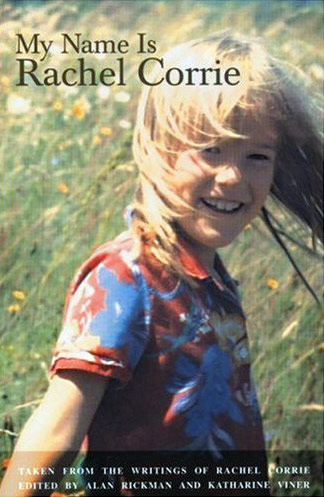 My Name is Rachel Corrie My first reaction to the death of Rachel Corrie was to sigh at the damfoolishness of a 23-year-old from Olympia who would place her body in the way of the Israeli army. On March 16, 2003, in Rafah, Palestine, an Israeli soldier drove his bulldozer over her and crushed her. I think of the Chinese man who blocked the column of tanks in Beijing on June 4, 1989. That man created an image and vanished, never leaving his face. Rachel left her face. In "My Name Is Rachel Corrie," now playing at the Seattle Repertory Theatre, actress Marya Sea Kaminski brings Rachel to life in a 90-minute monologue extracted solely from Rachel's diary and e-mails. Here is The Evergreen State College idealist, who declares, "I am building the world myself and putting new hats on everybody." The 9/11 attacks have provided a focus to her fervor. She is drawn to the Palestinians. She imbibes Arabic. Feeling that she must join in, she goes to Gaza to witness the Israeli occupation. Making use of her "international white person privilege" â an asset she feels she shouldn't possess but does â she joins a campaign to block the bulldozing of Palestinian homes, which is how the Israelis searched for smuggling tunnels. Still, Rachel says, "I worry we are not really effective. I still don't feel particularly at risk." The protesters take more risks â and the soldiers grow more steely. Toward the end, she says, "I am really scared and questioning my belief in the fundamental goodness of human nature." Her father, an actuary â Rachel denounces his "neoliberal job" â says in an e-mail he is proud of her but wishes her home. He knows the military. He served in Vietnam with the First Air Cavalry. He senses that this is not going to come out well. She has dreams of dying. "I can't die. I can't die," she insists. But she does. I spoke to her father, Craig Corrie. He said where Rachel was killed there had been two bulldozers (49-metric-ton Caterpillar D9s) and two soldiers in each one, plus an armored personnel carrier. There were six or seven protesters â and unlike the man in Beijing, the protesters in Gaza intended to stop the army permanently. For a while, the bulldozer drivers would stop at the protesters and yell at them. Then they were called away. After they came back, they didn't stop, and within five minutes Rachel was run down. Apologists say it was an accident. Perhaps the driver's intention was to force Rachel to jump aside, and it was an accident that her legs got caught in the advancing pile of dirt. The not stopping was no accident. Certainly, the Corries do not speak of accidents. Not once when I heard them did they say their daughter had "left us" or "passed away" or "died." Always they say she was killed. It was her death, and her expressive writing, that made Rachel Corrie an international figure. A British paper, the Guardian, asked to see Rachel's writing and published it. A Guardian editor, along with actor Alan Rickman (the terrorist in "Die Hard") made a play of it. It has been performed in London and New York only, and to much controversy. The play is doing so well at the Rep that it has been held over until May 6. Of course the play does not tell both sides. Neither did the 1960 movie "Exodus," which I saw as a kid. It told the Israeli side only, and in Paul Newman, put an American face on that side. For years, it was the only side Americans could see. The Palestinian side never had an American face. Now it does. It is a female face, an unthreatening face. Rachel's face. One wonders whether Rachel would think it was all worth it. Her mother, Cindy Corrie, says Rachel's story may open Americans to hearing the Palestinians' side, which would be a good thing. Still, she says, "Sometimes you want to reclaim your child for yourself." Bruce Ramsey's column appears regularly on editorial pages of The Times. His e-mail address is bramsey@seattletimes.com Source: http://seattletimes.nwsource.com/html/opinion/2003649756_rams04.html Don't be afraid of 'Rachel Corrie'Robert L. Jamieson Jr., Seattle P-I Columnist 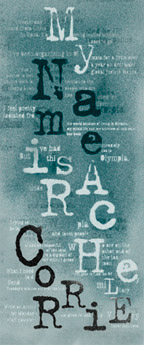 Let's talk "Rachel Corrie" -- the controversial play in Seattle, not the late activist. Even before the production opened in mid-March at the Seattle Repertory Theatre, folks were divided: Corrie was either a terrorist abettor or a human rights hero. She was killed four years ago trying to defend a Palestinian home from an Israeli military bulldozer. Some people believed her story should never see a stage unless equal voice was given to both sides of the Palestinian-Israeli conflict. People such as Robert Wilkes, a theatergoer from Bellevue whom I met at the Rep Sunday after a matinee. Wilkes said the play -- based on Corrie's writings -- errs by giving moral equivalence to Palestinians who he believes have brushed aside genuine Israeli peace efforts. "People love this play not because it is such a great piece of drama," said a frustrated Wilkes, who is Jewish. "It is because it's political." By "political" he means "anti-Israel." News flash: The best art, whether it deals with war or love in the time of AIDS or dark family secrets, touches political, social and moral nerves. If done well, a production can compel audiences to think. That's lost on folks so blinded by their cause they would rather see the stage dark than a ray of light shine on one of the most contentious issues of the day. Wilkes had a hand in the unusual ad in the program for "My Name Is Rachel Corrie." Titled "Don't Be Misled," the ad says Corrie was "recruited by an extremist group" and "used as a human shield" and calls the production "incomplete and one-sided." Granted, the play is subjective. People do not go to the theater or movies for objective or balanced perspectives. What happens on a stage is emotional manipulation in the service of drama. Yes, Israel has Arab countries near it that want to wipe it off the map. Yes, it suffers from Palestinian suicide bombers. Yes, retaliation from Israel has left Palestinians reeling. As a journalist, I'd be remiss not to point this out. But as a matter of art, Corrie's writing bears witness to the Palestinian suffering she saw. Her observations are ripe for a work of creativity, however unnerving. "The main objective of theater is not to be boring," David Esbjornson, artistic director for the Seattle Rep, said at a public forum after Sunday's show. In an interview, he told me: "If theater is doing its job right, there will be excitement about what is coming from the stage. It will be challenging." "Art is not journalism, not history," Rabbi Daniel Weiner of Temple de Hirsch Sinai in Seattle added at the forum. Weiner joins local Jews who support the play. He believes if the production evokes a range of feelings from pain to outrage to agreement, those emotions "shouldn't exist without a parallel desire to go out and learn more." The rabbi is spot on. The play should be a springboard to broader inquiry and conversation. It can motivate people to learn a thing or two about the Middle East or social activism or humanitarianism. Seattle teens who recently soaked up Corrie's words were moved to do something -- no, not rush out in front of bulldozers. They put paper to pen, went onstage at the Rep this week and told audiences what they deeply believe in, about their own journeys and struggles. Therein lies the power of art -- to inform, engage, inspire. Rabbi Weiner sees a personal, yet universally applicable message in the Corrie play, beyond politics and policy: "About how we balance our ideals with our abilities to implement them -- thwart cynicism in the face of difficulties." Those words could just as well describe the play -- its run has been extended, which is good news. Wilkes may loathe the show, but he's sure right about one thing: People love "Rachel Corrie" -- enough to go hear her words. Source: http://seattlepi.nwsource.com/jamieson/310397_robert05.html
Also Of InterestPage URL: http://www.inminds.co.uk/article.php?id=10063
|
|
Support Us
If you agree with our work then please support us.Campaigns INMINDS Facebook Live Feed Latest Video's
INMINDS Twitter Feed Tweets by @InmindsComFeatured Video's
You need Flash player 8+ and JavaScript enabled to view this video.
[all videos (over 200)..] Featured MP3 Podcast 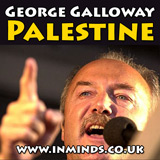 During the holy month of Ramadan, as we move towards the Eid, I was going around Muslim shops in Tower Hamlets and elsewhere telling them that although they had collection boxes for the Mosque, although they had religious imagery in their shops, although they were selling dates to the faithful people to break their fast - the dates were made in Israel! They were stained with the blood of the Palestinian people! And Muslim shop keepers were selling them! Respect MP for Tower Hamlets Respect Youth Tower Hamlets, Feb 2008 [21min / 11Mb] [all podcasts..] Newsletter Feedback |
 |
 |
























